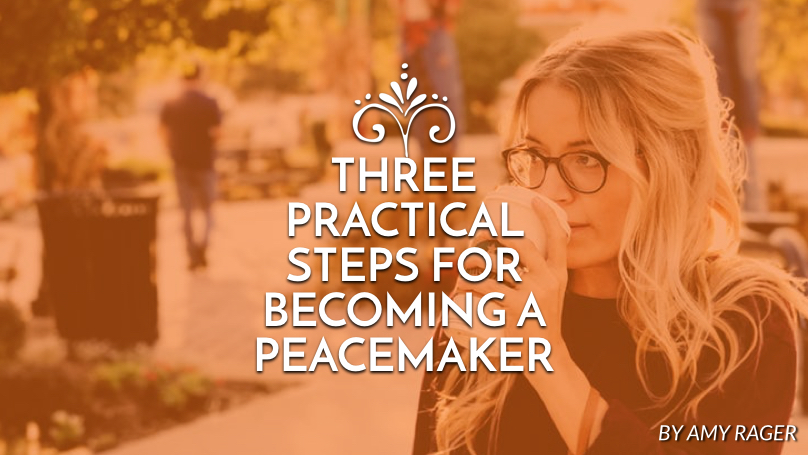“Blessed are the peacemakers, for they shall be called sons of God.” (Matt. 5:9)
Two kids come howling into the kitchen. One has a toy. The other insists he temporarily set it down while he went to the restroom. The pasta water is boiling over. The kids’ whining is like nails on a chalkboard. In a tone that can barely be classified as civil, a mother suggests each child find a different room to occupy.
Peace resumes. Or does it?
Each day, in a hundred moments like this one, you and I strive for what we think is peace. But if two children are smoldering in their rooms, planning how to avenge the evil that has befallen them, can we truly say we’ve brought about peace? Or have we only postponed conflict?
I believe our definition of peace is too narrow, too shortsighted, and too self-centered.
Jesus said, “Blessed are the peacemakers, for they shall be called the (daughters) of God.” (Matt.5:9)
Jesus didn’t need to command us to avoid conflict or to protect our own tranquility. That’s what we do naturally. Instead, the kind of person Christ is extending his blessing to is the person who brings true peace to others.
The Hebrew word for peace, shalom, refers to harmony, wholeness, prosperity, and welfare. We see this richer meaning of peace in Mark 5 when Jesus heals the woman with the issue of bleeding: “And he said to her, ‘Daughter, your faith has made you well; go in peace, and be healed of your disease.'” She walked away after encountering the Savior with restored wholeness, prosperity.and welfare. She received peace.
I don’t know about you, but when chaos arises, I need to stop thinking “How can I appease this person?” and begin praying “Father, how can I restore welfare here?”I’m sure the answer won’t be easy and it won’t be as quick a “fix” as postponing discord, but Jesus says there will be a blessing.
So, what practical steps can we take when there is conflict and we have the chance to be peacemakers?
Here are three practical steps for becoming a peacemaker.
Pray fervently and first
While the Bible calls us ministers of reconciliation, it is important to acknowledge that only God can give the kind of humility, strength, resolve, perseverance, and grace that true peace will require. Faithful attempts at unity are our responsibility, but we are at God’s mercy for the results. Plead with him. Pray to God that he would give you discernment and compassion and prepare the person(s) you are struggling with for a meaningful journey toward peace. Jesus prayed for our unity; it seems fitting we should pray for it as well. Verses for inspiration: James 3:18, Philippians 4:7, Proverbs 16:7, and Psalm 29:11.
Listen lovingly
Don’t make assumptions about another’s viewpoint or experience; ask her about it. Don’t judge your brother from a mile away or let bitterness brew in your heart; have the difficult conversation. Compassionate listening is powerful and giving validity to someone’s experience can build bridges. Verses for inspiration: 1 John 4:20, Romans 12:5,10, and 1 Timothy 5:1-2.
Rebuke when necessary
Deception is dangerous. Sin is oppressive. If after praying for and hearing what’s on another’s heart, you feel as if some sin on their part is causing the discord, it is your obligation to humbly rebuke them. As people who are capable of being deceived ourselves, we correct respectfully. Being for their good and restoration, we point them back to the things God intends. Peacemakers don’t avoid difficult conversations when someone’s spiritual welfare is on the line. Verses for inspiration: Romans 12:1-21, 1 Corinthians 12:26, 1 Timothy 5:1-2, and Proverbs 17:17.
Rinse and repeat
The process doesn’t end. Even if peace was restored it will be challenged again soon enough. Persevere. Stay committed to peace and to those around you.
“Aim for restoration, comfort one another, agree with one another, live in peace; and the God of love and peace will be with you.” (2 Cor. 13:11)
Published January 25, 2018



